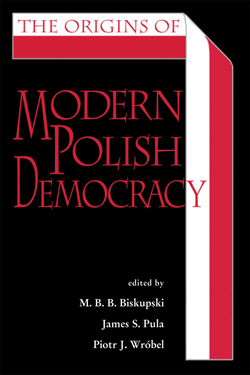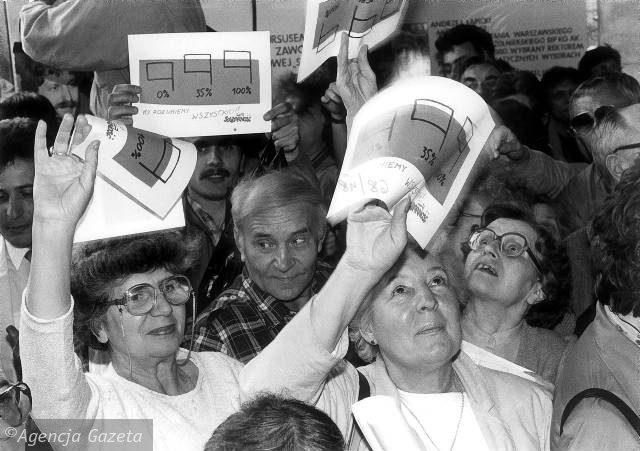 The Origins of Modern Polish Democracy
The Origins of Modern Polish Democracy
Edited by M.B.B. Biskupski, James S. Pula and Piotr J. Wróbel
Ohio University Press, 2010
Many people would be surprised to learn that during the time of increasing royal authority and absolutism in Europe, Poland followed a much different path than most of its neighbours with the establishment of a Nobles’ Republic. The Polish nobility, or szlachta, not only elected the King, but also limited his power and maintained numerous rights and privileges. Over time, however, this system suffered from a lack of centralized power, a situation exacerbated by growing foreign influence and in need of reform. The Polish Constitution of May 3, 1791, one of the first modern codified constitutions, sought to address these problems. Unfortunately, neither the May Constitution, nor the more progressive Połaniec Manifesto issued during the Kościuszko Uprising would come into being as the Polish-Lithuanian Commonwealth was destroyed as an independent state and partitioned by Prussia, Russia and Austria. Although the Polish nation was deprived of its independence, their early democratic traditions proved to be a basis for its ideas of democracy that continued to evolve throughout the time of partition, war, occupation, and the short periods of independence that followed. The Origins of Modern Polish Democracy is an engaging and insightful read that traces these developments in a series of ten articles by several notable scholars, each dedicated to a different period from the time following the failed 1863 January uprising through to Poland’s accession to the European Union.
The work begins with a brief but informative introduction by Daniel Z. Stone who surveys the history of Polish democracy prior to the time span covered in the book. Surveying the work of a number of historians who described Polish democracy with varying degrees of optimism, Professor Stone concludes that “Polish democratic traditions are deep-rooted” and that democracy is a fundamental value in Polish life.
The years 1863-90 are presented in an essay by Stanislaus A. Blejwas and describe how positivism and organic work became popular after the failed 1863 January Uprising. The Positivists rejected insurrection in favour of modernizing the economy, improving education and strengthening culture to form a strong middle class within the conditions imposed by partition. By the second half of the 19th century, however, the essay notes that support for nationalism, populism and socialism gained strength due to the new realities brought on by such advances in society.
Robert Blobaum follows by assessing the rise of these mass political movements, arguing that the increased polarization and competition among them would have a significant impact on Polish political culture into the inter-war period, while Włodzimierz Suleja covers the First World War, during which it was hoped that Poland would be restored on democratic lines, be it within the framework of a constitutional monarchy or a democratic republic, with attitudes shifting in favour of the latter over the course of the war. It is then up to Piotr Wróbel to detail the establishment of parliamentary democracy following Poland’s re-emergence after the war, including the turbulent “Sejmocracy” that preceded Józef Piłsudski’s May Coup and the increasing authoritarianism of the Sanacja regime. Wróbel analyzes why democracy failed in interwar Poland (as well as in other newly-established democracies in the region) largely attributing it to political instability, lack of education and not enough political experience, among other difficult social conditions that plagued the Second Republic.
The dark period of occupation during the Second World War is then considered by Andrzej Friszke, who appraises the political platforms of the domestic underground movements. In turn, Rafał Habielski offers an absorbing article on the Polish government-in-exile, which maintained its uncompromising stance throughout the Communist period until it transferred the pre-war insignia to the democratically elected president, Lech Wałęsa.

Elections campaign before 1989 contract elections in Poland.
Source: agencjagazeta.pl
Photo by Sławomir Sierzputowski
The period of Communist rule is scrutinized by Andrzej Paczkowski and Jan Skórzyński. While Paczkowski provides analysis of the 1945-68 period, he nonetheless takes care to accentuate that any conclusions made are still limited by the continued lack of sources, especially pertaining to underground organizations. Jan Skórzyński, examining the years 1968-89, argues that the various democratic movements were initially reform-oriented within a socialist framework and that free market ideals did not appear for some time. Finally, Piotr Wróbel reviews the period after the collapse of communism until the end of Leszek Miller’s minority government in 2004. He then carefully underlines the problems and challenges that Poland still faces as what he terms a transitional democracy. Overall, we are left with the impression that Poland is in a much better position than its interwar predecessor and will strengthen its democracy despite the difficulties that may still persist.
While it would be beyond the scope of this review to carefully detail and scrutinize every essay, each one offers well-argued and compelling reading concerning the progress that Polish democratic thought and practice underwent over the course of the 19th, 20th and into the 21st century. Moreover, as the first English-language work which covers this time period, it fills a glaring gap in scholarship that unfortunately still reflects the general lack of knowledge in the West regarding both Poland and east-central Europe. It is therefore a much-needed and appreciated addition that is a reminder of the continued legacy of Poland’s deep-rooted and domestic democratic heritage. Fortunately, with the appearance of Origins of Modern Polish Democracy, Poland’s contribution to the history of democracy, that for too long has remained obscure and unacknowledged, has finally been made available and accessible for a Western audience.
CR




Pingback: Four Key Takeaways from Poland’s Recent Presidential Election